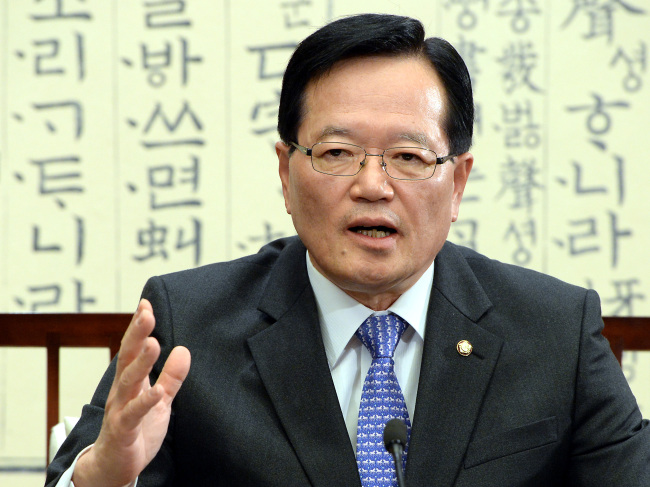Speaker rejects Blue House calls to put bills to vote
By Yeo Jun-sukPublished : Dec. 16, 2015 - 18:45
The National Assembly’s speaker Wednesday rejected Cheong Wa Dae’s demand to call a vote for contentious pending bills that President Park Geun-hye has been urging the legislative body to push through as soon as possible.
However, Speaker Chung Ui-hwa reiterated that he would use his authority to call a vote on a bill that would determine new rules for next year’s general election unless the rival parties’ lawmakers reached an agreement by the end of this year.
His remark came as President Park and the ruling Saenuri Party ratcheted up pressure on the speaker to bypass the deadlocked parliamentary committees and put to a plenary vote the overdue bills that aim to relax regulations on businesses and reform the labor market.
It was considered a setback to the presidential office’s accelerating attempts to pressure the Assembly into legislating Park’s economic policies, a move that Chung and main opposition party said would violate the democratic rule of separation of power.
“(If I propose the bill myself), it would be an act of constitutional violation. (My proposal) would bring more chaos to the nation and more harm to our economy,” the former Saenuri Party lawmaker said. By custom, the speaker leaves his or her party when assuming the position.
President Park Geun-hye on Tuesday denounced the Assembly for “failing to do its job,” highlighting that the pending bills are crucial to revitalize oversupplied industries and create jobs for young people. Her remark was widely seen as a pressure on Chung to greenlight the bills.
But the fifth term lawmaker refused to cite the economic situation as a reason for him to exercise his authority, disputing the argument that the nation’s economy is bad enough to constitute an “emergency situation” where the speaker could independently put the bills to a vote in a plenary session.
According to Clause 85 of the Assembly’s law, the speaker can bring bills to the floor without undergoing the committee’s review when the nation faces natural disaster or contingencies like wars, or when the Assembly’s political parties with more than 20 parliamentary seats agree to do so.

The main opposition New Politics Alliance for Democracy chimed in. NPAD leader Rep. Moon Jae-in blasted President Park for compromising democratic rule by intervening in the legislative body’s affair.
“Korea democracy is hurting. The president is ignoring the opposition parties and treating the speaker and the ruling party’s leader as if they are her subordinates. I think what the Park administration is doing is nothing but another version of dictatorship,” said Moon.
Rep. Ahn Cheol-soo, an independent who left the NPAD over a power struggle with Moon, echoed the criticism. He said on Twitter that the president is blaming the Assembly for her administration’s own failure and putting undue pressure on the head of the National Assembly.
While Cheong Wa Dae did not directly comment on Chung’s refusal, it repeated that it was up to the speaker to move things along at the Assembly.
Presidential secretary Hyun Ki-hwan had visited Chung’s office on Tuesday to urge him to exercise his power, and later criticized the lack of progress by saying the Assembly was “only looking out for the lawmakers’ interests.” Chung denounced Hynun’s remark as “crude and absurd.”
Saenuri Party members visited Chung’s office after his remark on Wednesday and urged Chung to accept the presidential office’s demand to propose the pending bills. The speaker reportedly refused once again, and the atmosphere grew tense as he yelled at the visiting lawmakers, according to insiders.
Saenuri leader Rep. Kim Moo-sung told reporters the same day that he is thinking of suggesting Park to exercise her presidential power to order an emergency legislation of economy-related bills without waiting for the Assembly endorsement. The authority was last used by late President Kim Young-sam in 1993 when he adopted policies to achieve transparency in financial transactions.
Meanwhile, the speaker reiterated that he would put to a vote the bill that aims to redraw electoral maps for the 2016 general election. Although prospective candidates began to register for the ballot Tuesday, the lawmakers have remained deadlocked over the rezoning scheme, meaning the candidates don’t yet know what their potential constituency will be.
“The right to vote is the most important fundamental right. We will face serious consequences unless we resolve the issue by the end of this year. I have to make a judgement call before parliamentary contingencies occur,” said Chung.
His remark came a day after the rival parties’ leadership failed to reach an agreement on the rules that determine the number of seats for lawmakers elected via vote by local constituencies and the seats for those who obtain their parliamentary seats through proportional representation.
The Saenuri Party has favored a plan to reduce the number of proportional representation seats, but the NPAD and another minor opposition party insist the 54 seats given to the proportional representation scheme remain the same.
By Yeo Jun-suk (jasonyeo@heraldcorp.com)





![[KH Explains] No more 'Michael' at Kakao Games](http://res.heraldm.com/phpwas/restmb_idxmake.php?idx=644&simg=/content/image/2024/04/28/20240428050183_0.jpg&u=20240428180321)






![[Grace Kao] Hybe vs. Ador: Inspiration, imitation and plagiarism](http://res.heraldm.com/phpwas/restmb_idxmake.php?idx=644&simg=/content/image/2024/04/28/20240428050220_0.jpg&u=)






